As a follow-up to our 2023 survey on seniors in the workplace, and to better understand the current and future employment status of older U.S. residents, ResumeBuilder.com surveyed 750 people ages 65 to 85 in September 2024.
Key findings:
- 13% of retired seniors say they’re likely to start working again next year
- Top reason for retirees returning to work is increased cost of living
- 22% of seniors are currently working
- 38% of working seniors don’t plan to retire for 5 or more years
- 4 in 10 working seniors were once retired
1 in 8 Retired Seniors Likely To Return to Work in 2025
Nearly 4% of retired seniors say they are very likely to return to work in 2025, while 9% claim they’re somewhat likely. Conversely, 12% claim they are somewhat unlikely, and 75% say they are very unlikely to return to work.
Of those considering returning, 13% plan to work full-time, 79% intend to work part-time, and 8% are currently unsure. Additionally, 13% would return to their previous employer, 30% would aim to work for a new employer in the same industry, and 57% would be looking to switch industries entirely.
When it comes to modality, 30% of seniors considering a return to work say they would prefer to be fully remote, while 4% would rather do hybrid work, and 31% say they would prefer being in person. The remaining 35% have no preference.
“The diverse preferences among seniors for remote or in-person work reflect the varying motivations behind retirees re-entering the workforce. Those who are driven to return to the workforce due to financial considerations often favor remote work, especially if they face mobility challenges, disabilities, or caregiving responsibilities. Remote roles offer them flexibility and convenience that align with their physical and personal needs,” says Resume Builder’s Chief Career Advisor Stacie Haller.
“On the other hand, some retirees return to work to combat feelings of boredom or isolation, seeking the social interactions and camaraderie that an in-person job provides. These individuals find fulfillment in office environments where they can build relationships and feel part of a team.”
Two-thirds are concerned about age bias
Approximately, 31% of seniors thinking of going back to work say they are highly concerned about age bias, and 35% are somewhat concerned. On the other hand, 23% admit they are not very concerned, and 10% say they have no concerns about this.
“Seniors must remain vigilant about ageism in the hiring process. It’s essential for older job seekers to be aware of potential biases and to learn strategies to combat them, such as staying updated on technology, highlighting recent skills, and addressing their value in terms of experience and reliability. Today’s job market is more competitive, and understanding the nuances of modern job searching is key to success for retirees,” says Haller.
Cost of living increase and boredom drive seniors back to work
The top reasons seniors are contemplating going back to work are related to cost of living increasing (69%), boredom (42%), rising housing costs (39%), and paying off non-medical debt (34%).
The majority say they are very (26%) or somewhat enthusiastic (53%) about going back to work.
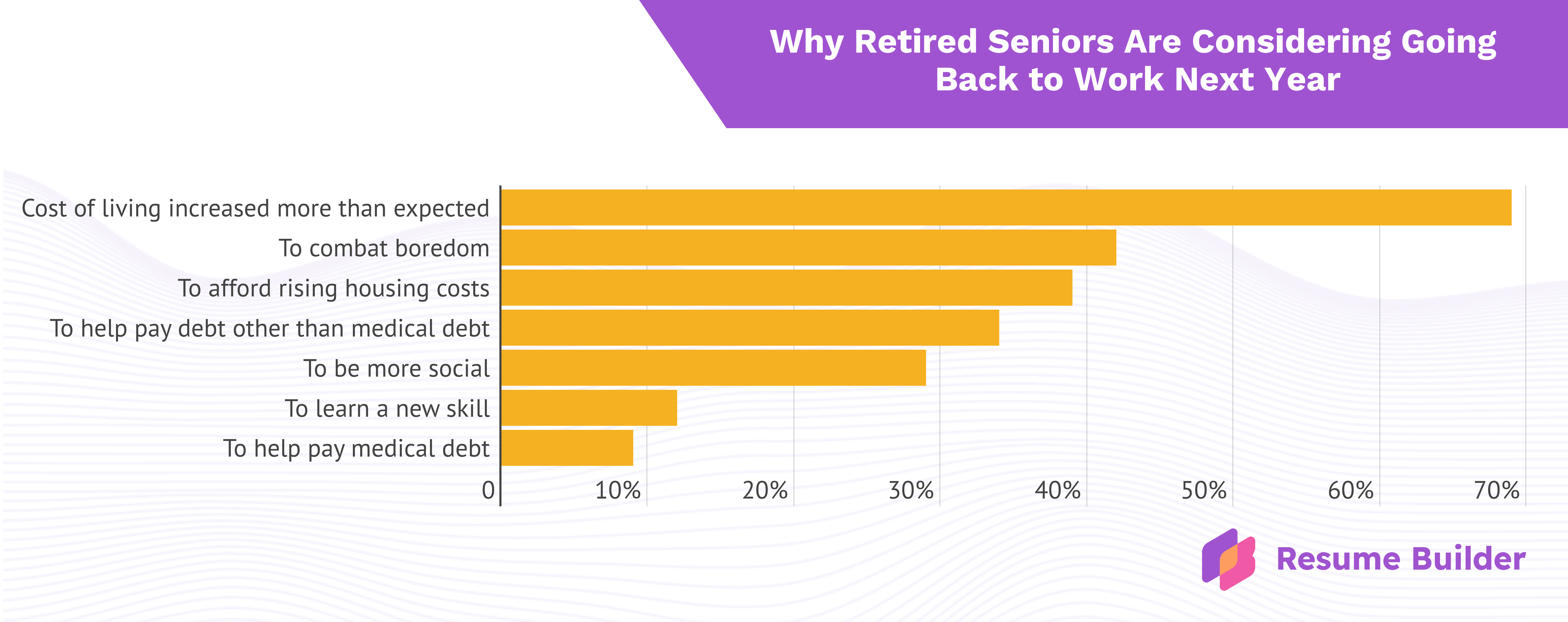
“For many new retirees, adjusting to this stage of life involves much more than financial considerations. I often work with individuals eager to return to work in ways that fulfill long-held passions or offer new opportunities they’ve never had time to explore. The freedom of retirement presents an exciting chance to break out of routines and try something new, which combats the potential boredom that can come from suddenly having more unstructured time. Retirement, for many, isn’t the end of work, but rather an opportunity to redefine it on their own terms,” Haller says.
4 in 10 Working Seniors Have Unretired
More than three-quarters (78%) of seniors are not currently working. However, 11% are employed full-time, and 11% are working part-time.
Of seniors who are employed, 39% have unretired and returned to work, while 61% have never retired.
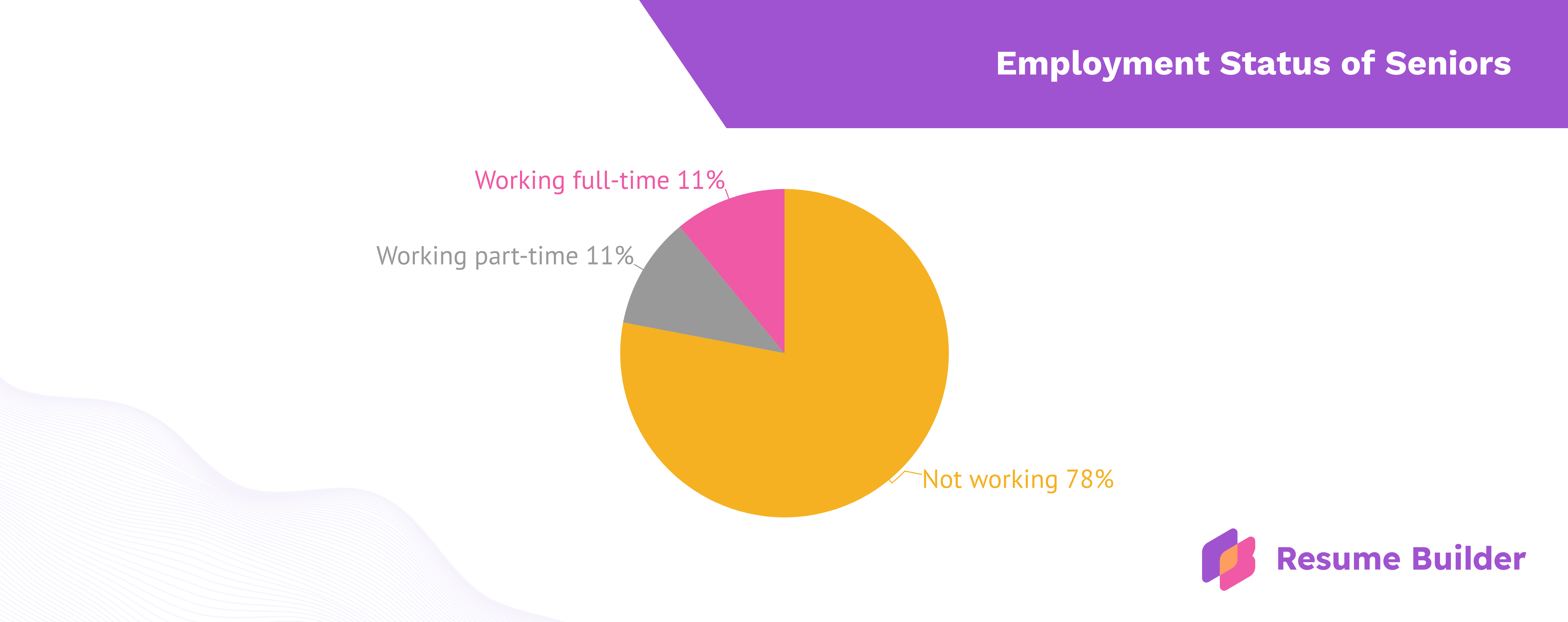
Of seniors who have unretired, 22% did in 2024, 29% in 2023, 18% in 2022, 8% in 2021, 5% in 2020, and 18% before 2020.
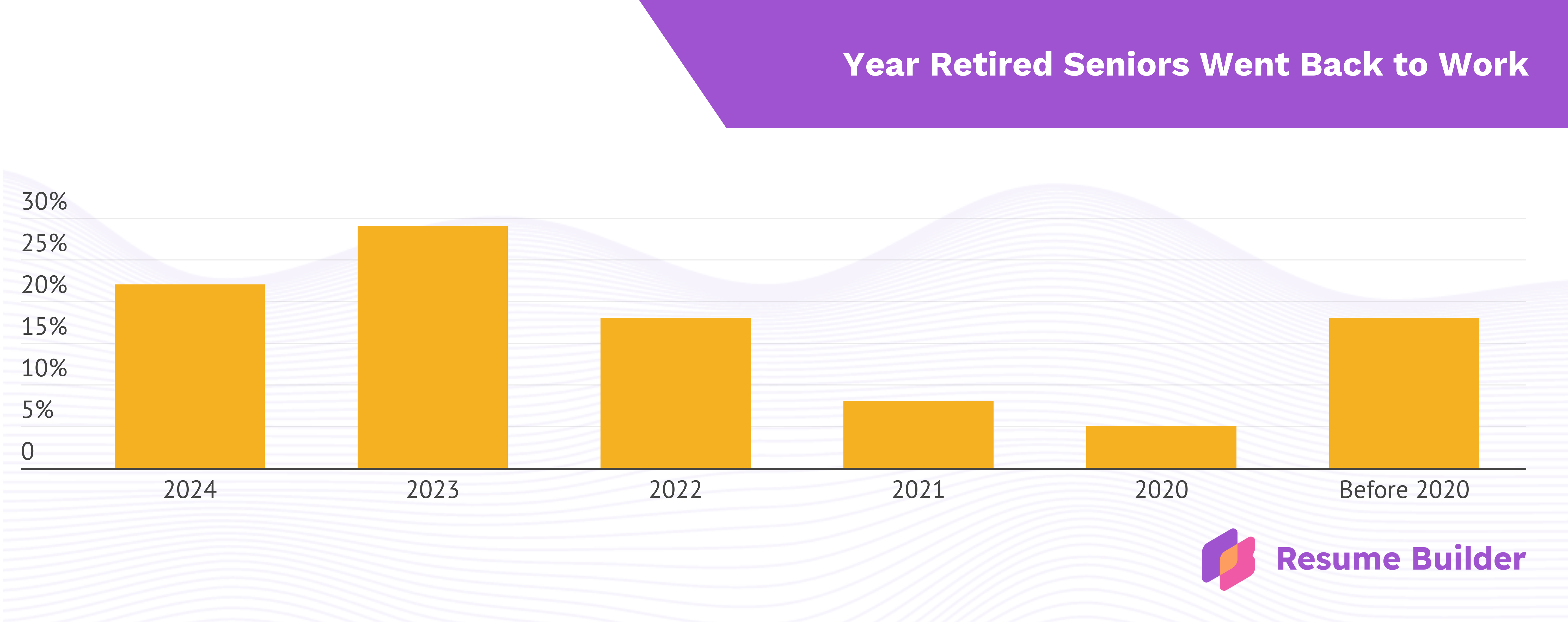
The top reasons seniors returned to work include the cost of living increasing more than expected (51%), boredom (40%), and insufficient retirement savings (37%).
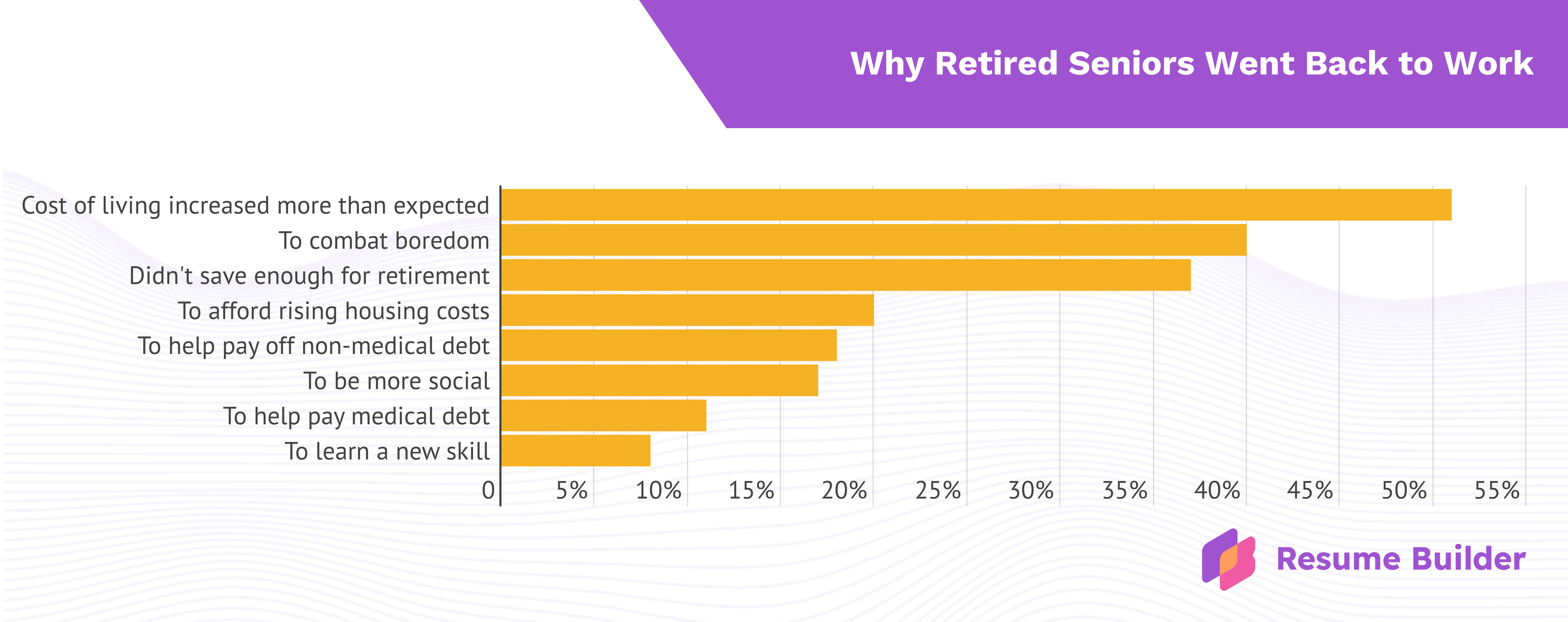
38% of working seniors don’t plan to retire for 5 or more years
When seniors were asked when they plan to retire, 6% indicated they plan to retire next year, 7% in one year, 24% in two years, 25% in three years, 6% in four years, and 38% in five or more years.
Top Reason Seniors Haven’t Retired Is They Enjoy Working
For seniors who have yet to retire, the most common reasons are they’re enjoying working (56%), they have not saved enough for retirement (44%), and they don’t want to get bored (42%).
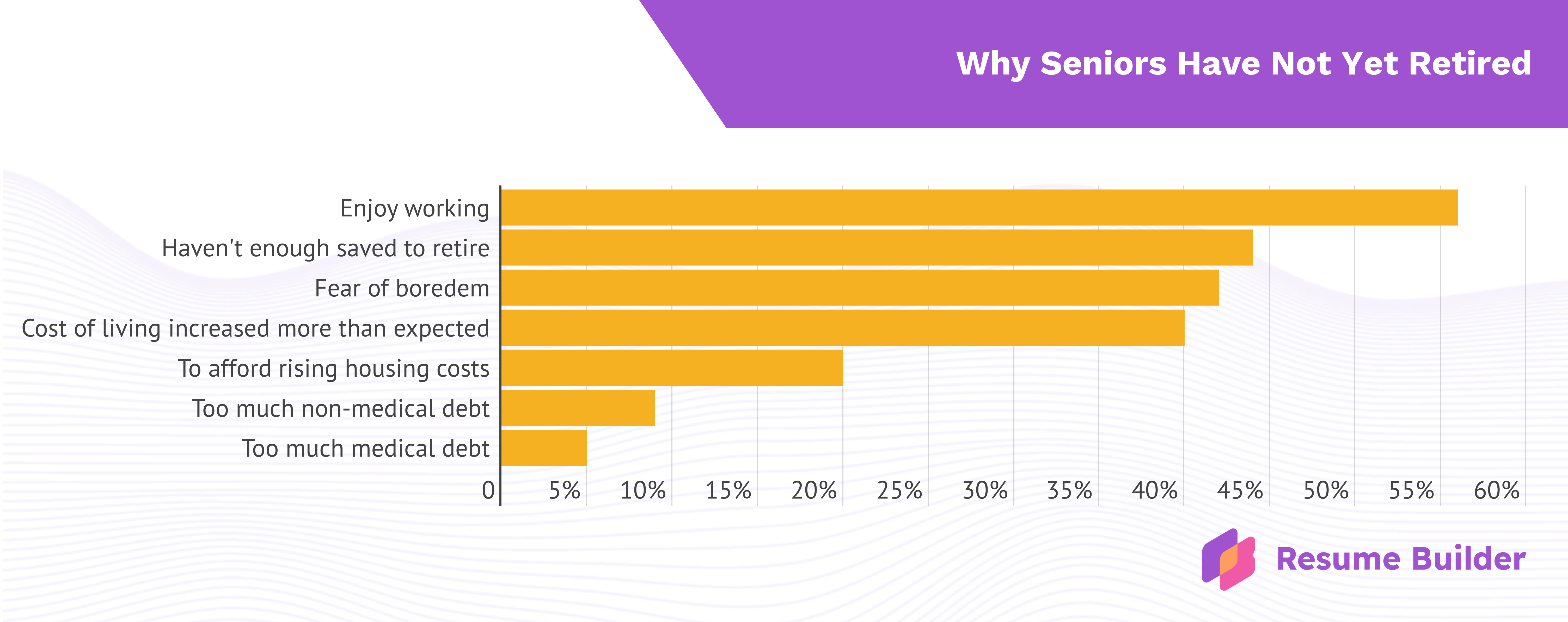
“The long-held assumption that seniors should retire in their 60s is quickly becoming outdated. Today, there is no set retirement age for those who wish to continue working or re-enter the workforce. Many seniors are choosing to remain employed not just for financial reasons, but because they still feel a strong desire to contribute in meaningful ways, often exploring new career paths or passions they never had the chance to pursue earlier in life. This desire goes beyond just income; it fulfills a need for social interaction, structure, and purpose.
“In our survey, 42% of respondents reported working to avoid boredom, illustrating that employment often enriches their lives by keeping them mentally and socially engaged. However, work isn’t the only avenue for staying active and fulfilled during retirement. Many seniors also volunteer, take classes, or engage in community activities to find purpose and stave off the monotony that can come with retirement.
“This shift highlights a broader trend: today’s retirees are redefining what it means to age by staying engaged, active, and purpose-driven in their later years, whether through work, volunteering, or lifelong learning,” finishes Haller.
Methodology
This survey, launched on September 6, 2024, was commissioned by ResumeBuilder.com and conducted online by the polling platform Pollfish. Overall, 750 U.S. adults between the ages of 65 and 85 completed the full survey.
For all media inquiries, contact [email protected].
